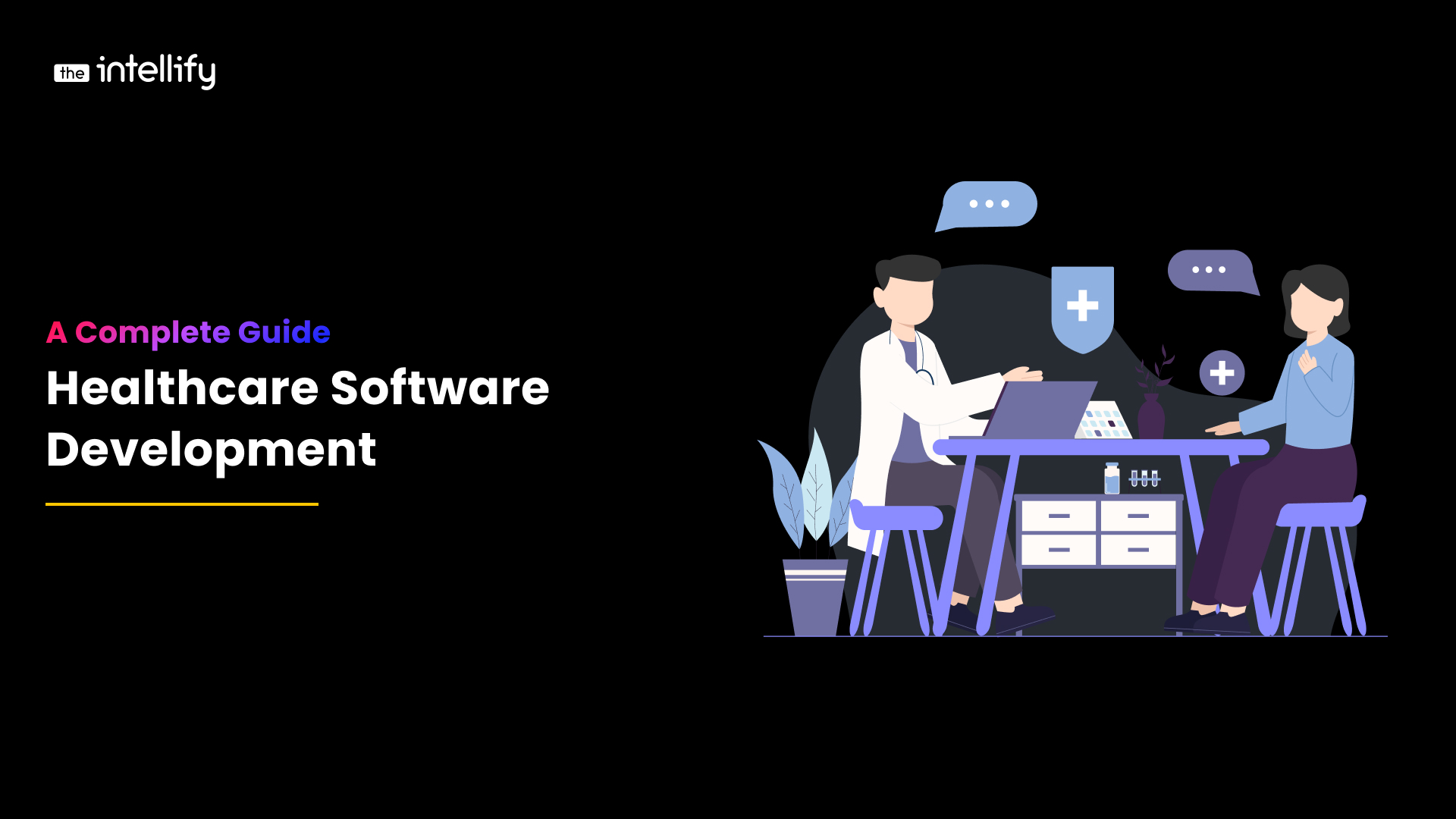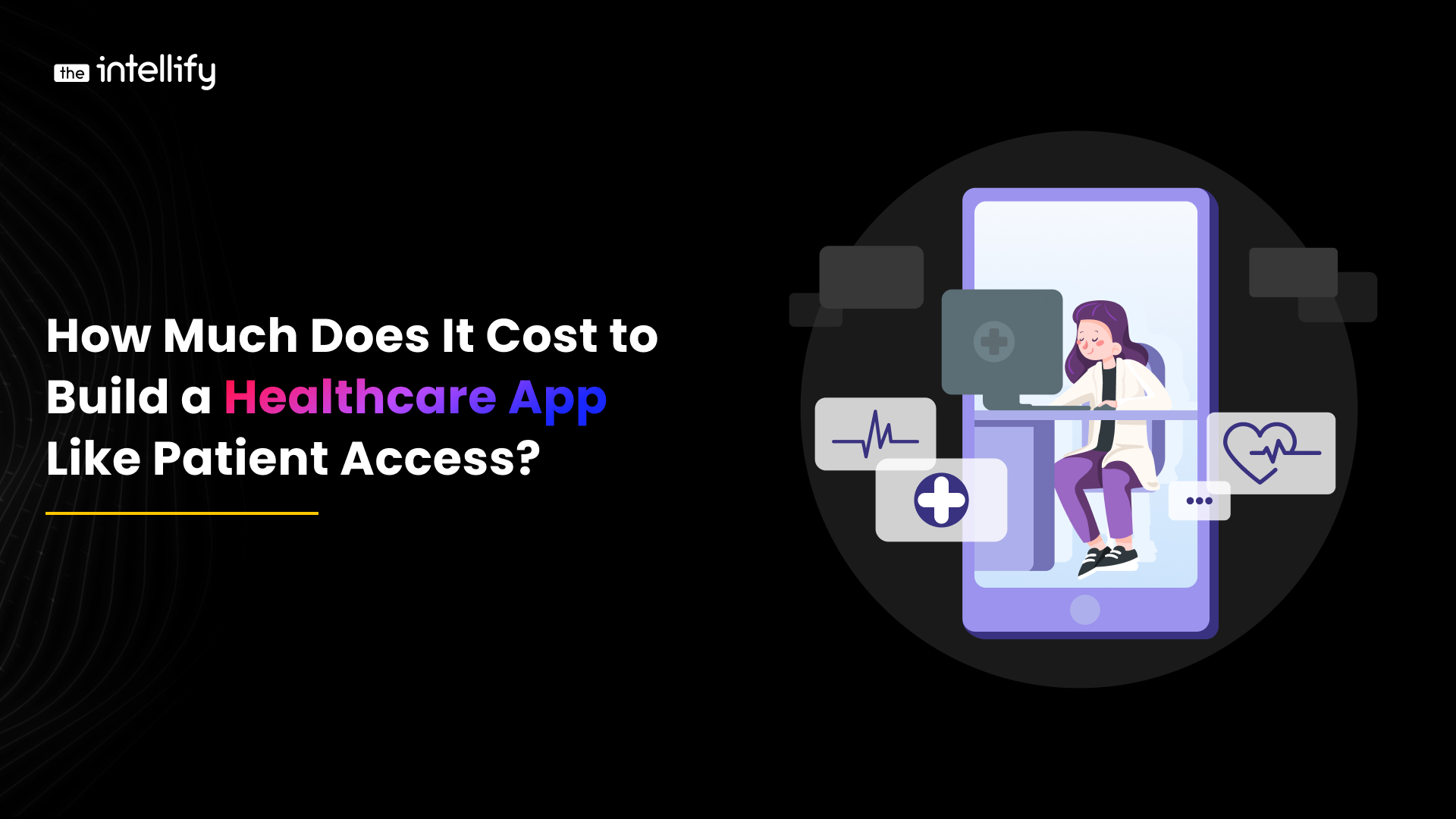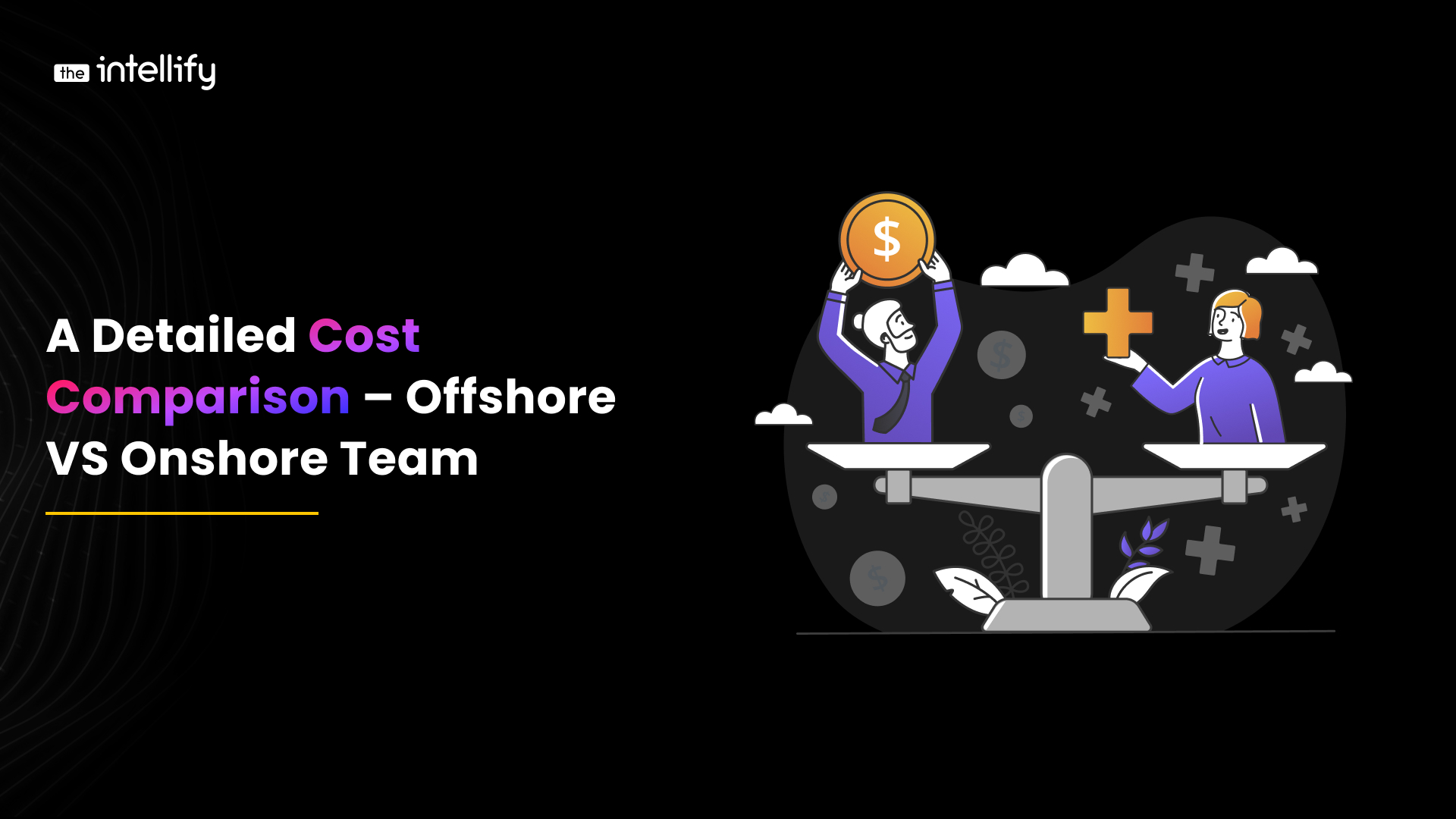
The healthcare software development industry is improving daily. According to Market Reports, the industry generated $600 billion in revenue this year. As a result, the importance of this software is increasing in the pharmaceutical industry as well. This software has excelled in administrative tasks such as patient care, streamlined data processing and other functions that have fueled its phenomenal growth.
Advances in healthcare software technologies such as Artificial Intelligence (AI) and the Internet of Things (IoT) have led medical companies to seek innovative solutions to enhance their healthcare platforms further. Healthcare software development is working in this space. This development process helps pharma and healthcare companies improve their healthcare platforms further.
In this article, we will define the landscape of healthcare software development. Describe its complexities and inner workings, and predict its future progress.
Healthcare Software Development Market Overview
Healthcare software development is complex and can take years to develop. Those who build custom healthcare for the healthcare industry must understand their clients’ needs. They can create such solutions. This software development process in healthcare is more complex as it involves patients, doctors, nurses, administrators, and other healthcare providers.
It would help if you worked with an experienced medical software development company to ensure your project meets your needs best. The specialists in this field specialize in custom healthcare software development. And have decades of experience working with hospitals, clinics, and other healthcare organizations. They have expertise in building a successful healthcare software solution through which the correct solution can be delivered on time. Now the question is: What is Healthcare Software Development?
What is Healthcare Software Development?
Healthcare software helps organize and execute many interactions and administrative tasks related to healthcare. Almost all patients, medical professionals, and health administrators come under it.
These platforms will help you with many healthcare-related tasks. Such as streamlining interactions and improving quality of care. Additionally, you can maintain the confidentiality and accuracy of the records of different service providers. Such as hospitals, clinics, research labs, financial services, and best medical equipment suppliers.
Machine learning has accelerated Software development for healthcare systems. This has improved the diagnosis process and the digitization of patient records. Also, Big Data and e-health have revolutionized healthcare software development.
Experts say this technology of developing healthcare software will do a great job maintaining clinical workflow and optimizing daily operations by helping to manage medical records, schedule doctor’s appointments with patients, and assist in accounting activities. Below, we discuss the types of healthcare software development.
Types of Healthcare Software Development
Electronic Health Record Software
With this healthcare software category, you can be facilitated to maintain, manage, and store patient data such as allergies, laboratory results, medical history, demographic statistics, etc., in electronic records. EHR can be integrated into an ERP system to improve healthcare and benefit any healthcare organization.
E-Prescribing Software
According to the survey report, Drugstores and pharmacies can enjoy this technology. Through this software, they can direct the transmission of medical records. It also helps increase connectivity within the healthcare industry, improving patient convenience.
Urgent Care
Urgent care comprises several apps and a crucial healthcare software category. This software allows patients to contact doctors and access emergency care without visiting the clinic.
Hospital Management Software
This software can help hospitals with hospital management, insurance recruitment, billing, patient information management, and other related tasks.
Healthcare CRM
This software is developed to improve customer management. It helps improve client relationships through quality care, communication management, and accurate performance reporting.
Telemedicine Software
With this software, medical professionals can examine. And diagnose patients through video conferencing and file-sharing tools.
Laboratory Information Management Systems (LIMS)
LIMS is software that helps the laboratory get more accurate results by integrating sample management, automated workflows, and data collection tools.
Radiology Information Systems (RIS)
First, RIS software tracks patient information and images, then schedules appointments, reports results, and manages invoices. Completing this process speeds up diagnosis in the radiology department and improves the quality of patient care.
Pharmacy Management Systems
This software is designed to improve pharmacy efficiency. It does so by managing expired medicines, retrieving inventory, storing customer data, and ensuring the efficient running of medical stores by sending SMS reminders to patients.
Health Information Exchange Software (HIE)
HIE or Health Information Exchange software allows medical professionals to and share their patients’ personal health information with other organizations, making care more efficient and reliable.
What Do Healthcare Software Development Companies Do?
The demand for technology in the medical field is increasing daily. That greater demand has, so, led to the presence of specialized healthcare Software Development Companies.
They provide several optimization services that benefit private organizations, hospitals, and medical schools. The range of enhancements requested drives the search for a reliable software development partner.
Medical institutions need IT solutions, but their implementation is cost-oriented. So, it is expected from a hired software development company that they develop an efficient and cost-effective solution through cost optimization.
They build technology that provides data to check financial KPIs, critical analysis, and client behavior. Based on these parameters, the cost of a healthcare software Development Company is charged.
Below, we discuss the three services software development companies usually offer.
Healthcare Software
These technologies assist the healthcare organization manage the data and improve the care quality, such as:
- Improves diagnostic capabilities.
- Security and compliance.
- Intelligent imaging and radiology.
- Improve the Healthcare operations and resource management.
Healthcare Apps
Use the mobile device to track your health condition, including:
- Monitor the telehealth and remote.
- Virtual assistants and chatbots.
- Patient engagement.
- Personalized treatment through AI.
Custom Solutions
Task-oriented software or a mobile solution designed to fulfil customer requests.
- Digital transformations.
- Data exchanges.
- Patient-centric approaches.
- AI and machine learning applications.
Healthcare software development companies like The Intellify always try to ensure client satisfaction by providing accurate results. As a result, they focus on task-based solutions. This technology introduction aims to establish a universal healthcare ecosystem that benefits society. So, the high-end software development company strives to provide a comprehensive range of services for healthcare organizations, such as IT consulting, mobile/web development, cloud technology, and IT outsourcing.
Yet, the healthcare industry still faces many uncertainties and challenges in its path to digital transformation. Our expertise allows us to consider different technologies, use cases, and solutions for developing professional and responsive software.
We have strong domain expertise to suggest solutions to these business challenges. You can avoid problems by supplying and installing them. Contacting our healthcare experts will answer all your questions. The Intellify developers are talented enough in offshore healthcare software development.
Cost of Software Development in the Healthcare Industry
You can expect to spend anywhere from $200,000 to $388,000 to develop your healthcare software. Yet, these costs may vary depending on your budget, timeline, and specific needs, which are discussed here
Type of Collaboration
While considering an in-house team or outsourcing, it’s important to consider resource availability, budget constraints, and various other constraints.
Team Composition
The size, expertise, and technology stack of the development team you choose can affect your costs.
Project Complexity
The design complexity of the project and the number of features you want to add may influence the project’s budget.
Development Timeline
Complex projects always need more time and resources, which affects the development project’s cost.
Healthcare Software Development Process
The sequence of steps to develop healthcare applications is the same for all companies; it differs from company to company. Again, the application development process may vary according to product requirements.
Find out the Problem and try to Solve it
The expectations of medical professionals, patients, and healthcare users and market saturation are increasing.
Hence, the critical step in successful best mobile app development is to focus on the right problem and provide the right solution. For this reason, conducting thorough market research and observing your competitors is necessary to identify gaps and devise the right way to solve your product requirements.
Define the Target Audience is crucial
Any apps, especially healthcare apps, need a strong user base. Because they aim to offer inclusive solutions to all customer needs.
Knowing the needs and preferences of the target group before developing an app will help you create efficient apps. This allows you to win over users instead of guessing and following a hit-and-miss approach.
For example, accessibility is one of the most essential features of healthcare software. If your focus customer is older people, consider using big buttons, fonts, and simple and clean UI/UX.
Focus on developing a Scalable Design
The first version of an app has limited functionality, which helps the app run. If your app is small but designed to ease specific problems, it can be much more effective for users.
So, from the beginning, you need to focus on building scalable apps that will help you create better customer personas over time. This will increase your target audience. Yet, you must add new functionality and updates to improve the app’s performance.
Assemble the Team and Tech Stack
After deciding on the app’s core functionality and design, you must hire an experienced developer team to move your custom healthcare software development process forward.
It is important to remember that you should not rely on a single developer to provide real value to your users. Your product team should include professionals such as a project manager, senior and junior developers, UX/UI designers, etc.
Once the team is assembled, your next task is to choose the appropriate technology stack for the project. In the case of native or cross-platform app development, your target customers will be iOS or Android users or both platform users. You can choose the proper structure.
Don’t avoid to create the Minimum Viable Product (MVP)
Many may think this phase is unnecessary, but you can skip it and build a complete app. But as an experienced developer, You make best MVP product version. By making it, you will get to know the usage and feedback of early customers, which is necessary for the successful development of your product.
Healthcare software applications are expensive, so by developing an MVP, you can first gauge your users’ interest in the product.
Don’t underestimate the value of app Testing
Exams have a phenomenal value, which should not be underestimated. Software testing helps you check the app’s user experience, uncover development issues, and collect feedback, enabling you to make necessary changes to your app.
App testing also allows you to test the target audience and check compatibility with the requirements. You can choose between unit testing and functional testing, which help you think from the user’s point of view and their user’s point of view
Lastly, Releasing Product and Maintenance
This is the final stage; it’s time to release your app in the market. All apps need constant support and maintenance, so understanding the importance of mobile app maintenance is important. Proper maintenance will help your app stay safe from cyber threats, upgrade, and stay up-to-date with third-party API updates. So, if you don’t care about app maintenance, you will face a significant financial penalty to the healthcare organization.
What’s the Future of Development in Healthcare?
Deloitte says that software development is driving the healthcare industry. Choosing a secure platform, providing customer-driven care. And providing easy data exchange will help, so the future of healthcare development is bright.
This technology reinforces the human-centered approach to healthcare, offering many solutions, including optimization of treatment plans, easy tracking of health progress and availability of online professional consultations.
The trends in healthcare software development in the medical field are discussed below:
Focus on self-care and online communication (via a patient portal, especially). The focus is always on accessibility, and user-friendliness is crucial. It will help, via a patient portal, to understand the population’s needs.
Involvement in blockchain innovation. It is a technology that also helps democratize the sector. Blockchain, in particular, helps expose internal operations. As a result, the exchange becomes more transparent, trustworthy, and collaborative.
Expanded EMR software. This technology will help digitize every medical record in the future, connecting all the currently segregated healthcare specialties.
Telemedicine. This innovation will help connect the doctor and patient more.
AI. Through this, the diagnosis becomes more accurate and precise. It also helps in making the treatment plan accurate.
VR/AR. The uses of this technology are endless in the medical field, including the training of medical professionals about healthcare, treatment, and patient education.
Chronic disease management tools: Latest Mobile apps or wearable devices in healthcare can be a game changer for the public.
Summing It Up
In conclusion, healthcare software development stands as a crucial frontier in the ongoing evolution of medical technology. This comprehensive guide explored the myriad facets of crafting innovative solutions that enhance patient care, streamline operations, and advance medical research. From understanding the unique challenges of the healthcare industry to navigating regulatory frameworks and harnessing cutting-edge technologies like AI and IoT, the journey of healthcare software development experts team, diligence, and a deep commitment to improving lives.
We have experience designing and developing almost all types of healthcare software so that we can provide high-quality support. The healthcare software development solution provided will serve you in the long term and help you integrate into the digital ecosystem. As a result, you can manage the data.

Written By, Shravan Rajpurohit
The CEO and Co-Founder of The Intellify . Shravan loves to experiment with new techniques and strategies. The posts written by Shravan are awesome for businesses who are seeking for Development ideas.
Table of Contents
- Healthcare Software Development Market Overview
- What is Healthcare Software Development?
- Types of Healthcare Software Development
- What Do Healthcare Software Development Companies Do?
- Cost of Software Development in the Healthcare Industry
- Healthcare Software Development Process
- What's the Future of Development in Healthcare?
- Summing It Up
Ready to Build Your Own Web App?
Get a Quote Now

How Much Does It Cost to Build a Healthcare App Like Patient Access?
Costs of Developing Healthcare Apps In the quickly changing landscape of digital healthcare, patient-centric apps like Patient Access have emerged as critical tools for improving patient care and expediting medical procedures. These apps let users arrange appointments, access their medical information, manage medications, and contact healthcare providers from the comfort of their own homes. The […]


A Detailed Cost Comparison Offshore VS Onshore Teams
Detailed Cost Comparison Offshore VS Onshore Teams The world is always changing due to globalization. The choice between offshore vs onshore outsourcing teams is crucial for companies. Thanks to globalization, which erases boundaries. Organizations can depend on a vast talent pool worldwide. This has led to offshore outsourcing. In it, a team from another country, […]


Top 10 Healthcare Business Ideas to Boost Your Startup Success
Innovative Opportunities for Startups in Healthcare Startups find the healthcare sector promising. This is because demand for better and more accessible healthcare is growing. New technologies, like telemedicine and wearable health devices, create innovation opportunities. They also create chances for improvement in patient care. Blockchain technology can also enhance data security and streamline healthcare processes. […]


How Much Does It Cost to Build a Healthcare App Like Patient Access?
Costs of Developing Healthcare Apps In the quickly changing landscape of digital healthcare, patient-centric apps like Patient Access have emerged as critical tools for improving patient care and expediting medical procedures. These apps let users arrange appointments, access their medical information, manage medications, and contact healthcare providers from the comfort of their own homes. The […]


A Detailed Cost Comparison Offshore VS Onshore Teams
Detailed Cost Comparison Offshore VS Onshore Teams The world is always changing due to globalization. The choice between offshore vs onshore outsourcing teams is crucial for companies. Thanks to globalization, which erases boundaries. Organizations can depend on a vast talent pool worldwide. This has led to offshore outsourcing. In it, a team from another country, […]


Real Estate Mobile App Development 101: All You Need to Know
Today, the real estate industry is improving with the help of new technology. Mobile applications are one of the major aspects of this shift. Real estate mobile app development has become crucial for such businesses, which must remain relevant. The applications benefit buyers, sellers, agents, and property managers. In the contemporary world, individuals desire convenience […]

0
+0
+0
+0
+
Committed Delivery Leads To Client Satisfaction
Client Testimonials that keep our expert's spirits highly motivated to deliver extraordinary solutions.

Let’s start a Conversation about your Business Goals!
Drop us a line to Start a Project with us
Contacts For Business
Contacts For Career












